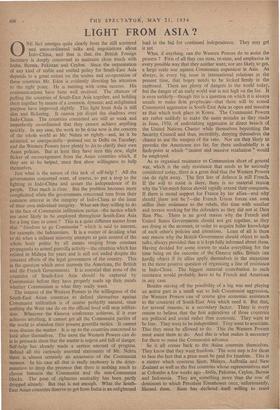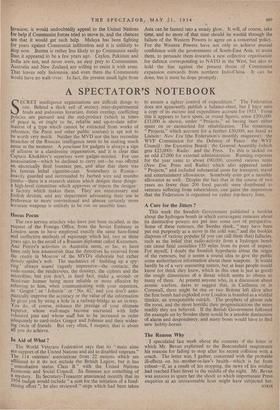LIGHT FROM ASIA ?
0 NE fact emerges quite clearly from the still scattered and unco-ordinated talks and negotiations about Indo-China, and that is that the British Foreign Secretary is deeply concerned to maintain close touch with India, Burma, Pakistan and Ceylon. Since the organisation of any kind of stable and unified policy for South-East Asia depends to a great extent on the wishes and co-operation of these countries Mr. Eden is evidently directing his attention to the right point. He is meeting with some success. His communications have been well received. The chances of pulling the countries of South-East Asia together, and holding them together by means of a common, dynamic and enlightened purpose have improved slightly. This light from Asia is still dim and flickering. It cannot yet dispel the shadows over Indo-China. The countries concerned are still so weak and imperfectly co-ordinated that they cannot achieve anything quickly. In any case, the work to be done now is the concern of the whole world as Mr. Nehru so rightly—and, let it be admitted, so unexpectedly—pointed out in Delhi on Tuesday; and the Western Powers have plenty to do to clarify their own Asian policies. But at least they have seen this new, slight flicker of encouragement from the Asian countries which, if they are to be helped, must first show willingness to help themselves. lead in the bid for continued independence. They may get it yet.
What, if anything, can the Western Powers do to assist the process ? First of all they can state, re-state, and emphasise in every possible way that they neither want, nor are likely, to get, a large scale war against Communist expansion in Asia. As always, in every big issue in international relations at the present time, that bogey needs to be locked firmly in the cupboard. There are plenty of dangers in the world today, but the danger of an early world war is not high on the list. It is even unlikely—though this is a question on which it is always unsafe to make firm prophecies—that there will be armed Communist aggression in South-East Asia as open and massive as that which took place in Korea. The Communist Powers are rather unlikely to make the same mistake as they made in June, 1950, of undertaking aggression in direct breach of the United Nations Charter while themselves boycotting the Security Council and thus, incredibly, denying themselves the chance to use the weapon of the veto. Nor are they likely to provoke the Americans too far, for there undoubtedly is a flash-point at which " instant and massive retaliation " would be employed.
As to organised resistance to Communism short of general war, which is the only resistance that needs to be seriously considered today, there is a great deal-that the Western Powers can do right away. The first line of defence is still French. If the will to resist is there, there is no material reason why the Viet-minh forces should rapidly extend their conquests. If them is moral support for France by her allies—and why should there not be ?—the French Union forces can soon stiffen their resistance to the rebels, this time with weather and terrain working for the defenders as they did not at Dien Bien Phu. There is no good reason why the French and United States Governments should not get together, as they are doing' at the moment, in order to acquire fuller knowledge of each other's policies and intentions. Least of all is there any reason why the British Government should object to such talks, alWays provided that it is kept fully informed about them. Having decided for some reason to stake everything for the time being on the outcome of the Geneva talks, Britain can hardly object if its allies apply themselves in the meantime to the more positive question of organising a line of resistance in Indo-China. The biggest material contribution to such resistance would probably have to be French and American in any case. Irrabseiolpn;ifit would ui.rstdfonubteds tlyriedaptpen amlntvoe th U in, and nnnied Nations or United nhaatonness ate that it would get such help. Malaya has been fighting .or years against Communist infiltration and it is unlikely to 'top now. Burma is rather less likely to go Communist easily ,..han it appeared to be a few years ago. pylon, Pakistan and India are not, and never were, an easy prey to Communism. Australia and New Zealand are willing to resist it with arms. That leaves only Indonesia, and even there the Communists would have no walk-over. In fact, the present small light from Asia can be fanned into a steady glow. It will, of course, take time, and no more of that time should be wasted through the failure of the Western Powers to agree on a concerted policy. For the Western Powers have not only to achieve mutual confidence with the governments of South-East Asia, to assist them, to persuade them towards a new collective organisation for defence corresponding to NATO in the West, but also to hold the line against the present threat of Communist expansion outwards from northern Indo-China. It can he done, but it must be dope promptly.



































 Previous page
Previous page